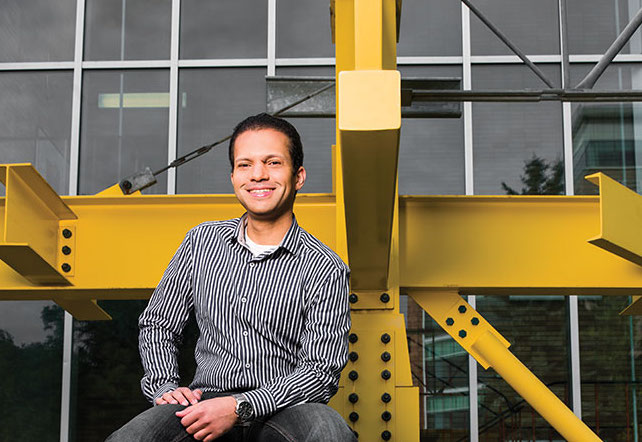Age: 37
Job Title: Director of Outreach and Product Services, Association of Professional Engineers and Geoscientists of Alberta
Why He’s Top 40: He’s strived to make science and math learning engaging for young people.
How I Relax: Early-morning swimming (“If I miss it for a couple of weeks, you can sense it on me.”) and family time with his wife and four-year-old son.
For many kids, science and math is utterly boring. “Ask a child, ‘Do you want to sit in science or math class, or play outside?’ and it’s a no-brainer,” says Mohamed El Daly. Very few of them are eager to sit at their desks and watch their teacher scrawl notes on the board.
But science, technology, engineering and math (STEM) subjects can – and should – be fun to learn about, says El Daly, who is originally from Egypt. The problem lies in how they are taught. “There’s a problem with our education system – it’s very outdated and was designed in a different era,” he says. Kids need more hands-on experiences and exposure to technology than many schools offer.
Fortunately, the Egyptian school system didn’t deter El Daly from engineering. He found the discipline fascinating enough to earn two degrees and then he came to the University of Alberta and got a PhD. But he’s also worked for years in STEM outreach in Egypt, trying to undo the damage caused by boring science education.
Two years ago he started as the outreach coordinator and director of DiscoverE, a STEM-oriented year-round summer program for children, headquartered at the University of Alberta.
El Daly is particularly passionate about encouraging women and Aboriginals, since they’ve been underrepresented in STEM careers – and DiscoverE’s enrolment. A recent robot camp for girls, for instance, involved solving word problems – not building stuff widget-by-widget. Since taking this approach, the number of girls in DiscoverE programs has risen to 42 per cent of all registrants, from 35 per cent.
In September, El Daly began a new position with the Association of Professional Engineers and Geoscientists of Alberta, doing similar outreach work with women and Aboriginal communities. “The impact you see – not just in the kids but the team working with you, who tell you they … got passionate about it – that makes it worth it.”
